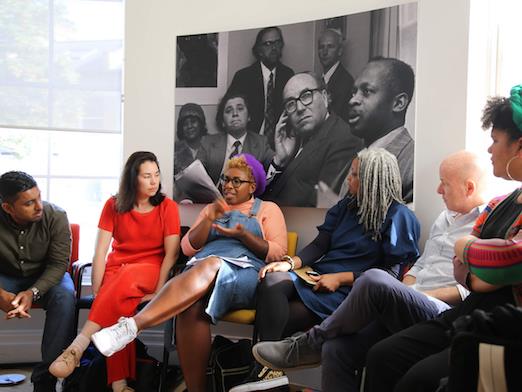The INTERSECT Cohort at meetings in the UK; image courtesy The British Council
INTERSECT is a new initiative led by the British Council and Diversity Arts Australia, and kicked off in September with delegates meeting in the UK.
Six selected curators, artistic directors and producers – all of whom identify as having minority ethnic and First Nations backgrounds – met in London to begin their nine-month peer mentorship and knowledge exchange.
The project is about addressing the balance of representation on our stages, in our art galleries and on screen by focusing on decision-making programmers in the arts and cultural sectors. It is viewed as a long-term initiative, tracking through to March 2019.
The INTERSECT cohort are:
- Adelaide Bannerman, Project Manager and Curator (UK)
- Jacob Boehme, Creative Director of YIRRAMBOI Festival (Aus)
- Candy Bowers, Producer and Theatre-maker (Aus)
- Natalie Ibu, Artistic Director and CEO of tiata fahodzi (UK)
- Abdul Shayek, Artistic Director of Fio (UK)
- Mikala Tai, Director of 4A Centre for Contemporary Asian Art (Aus)
Lena Nahlous, Executive Director of Diversity Arts said of the program: ‘The UK and Australia are very different on the one hand but there is also a lot of commonality and links in terms of our histories of migration and colonisation.
‘We share similar issues in terms of the under-representation of people from culturally diverse backgrounds in our sectors and both the UK and Australia have undertaken research and are facilitating discourse around the lack of diversity and inclusion.’
The Australia Council’s 2017 Making Art Work report found that people from a non-English speaking background account for only 10% of the arts workforce, compared to 18% of the general workforce.
The Arts Council of England found that people from a minority ethnic background make up 11% of staff at their National Portfolio Organizations and 4% of staff at Major Partner Museums compared to 16% of the general workforce.
Director of the British Council in Australia, Helen Salmon added: ‘INTERSECT seeks to strengthen diversity and opportunity in a place where power lies – among those who decide whose work is seen, what is seen, how it is seen and who sees it, thereby multiplying the impact.
‘By connecting programming decision-makers who have growing power and influence in the UK and Australian arts, we hope to support platforms for art that reflect, resonate with and enrich our whole society,’ Salmon said.

Abdul Shayek; Adelaide Bannerman; Natalie Ibu; British Council Australia Arts and Programme Manager, Anna Hay; Director of The Clore Leadership Programme, Hilary Carty; Mikala Tai; British Council Australia Country Director, Helen Salmon; Jacob Boehme; and Candy Bowers. Image supplied.
The real value of an international knowledge exchange
The three Australians in the cohort have just returned from their UK-based knowledge exchange and meeting, the itinerary of which was designed by the UK delegates.
Mikala Tai, Director of 4A told ArtsHub. ‘What made a real impact on me was this concept of micro practice, where it is the culmination of many gestures and actions over a sustained period of time that can shift thinking and evoke change. Sometimes big moves and big actions get attention but it is the subtle but critical shifts that support structural change.’
For Candy Bowers the real value lay in meeting and gaining a meaningful understanding of peers. She described it as ‘a stroke of genius’.
Bowers continued: ‘The ability to see and hear each other on a level that is rarely fostered was transformative because our discussions started deep and just got deeper. Less explaining was necessary and a whole lot of detailed and complex problems could be addressed.’
Jacob Boehme continued that he learnt a key piece of peer advice from the exchange: ‘I think there’s a lot to be said for knowing when to say no. Knowing when to walk away. Knowing where to put your energy. And finding the confidence (and giving yourself permission) to do so,’ he told ArtsHub.
The value factor was not one-sided, according to UK participant Natalie Ibu, Artistic Director and CEO of tiata fahodzi, described as ‘a theatre company for Britain today’.
‘I want to connect up with other culturally diverse creative practitioners and activists to reenergise my battle cry, provide a bit of context and distance from my own sector so I can see it anew, with fresh eyes and inspiring me with other stories, perspectives and tactics,’ Ibu said.
What does peer mentorship mean?
As an arts sector, we have long considered mentoring – less experienced artists and arts workers learning from those with more time on the clock. However, more recently mentorships have been rethought, with such programs now embracing mentoring down and sideways.
Bowers said of the sideways mentoring experience that INTERSECT offers: ‘Mid-career can be a hard spot as burn out and losses can be debilitating. Having a deeper understanding of how my current and growing network can inspire buoyancy and build to more sustainablity for diverse leaders was a major takeaway moving forward.
She continued: ‘One of the key messages from the INTERSECT London trip was identifying networks, using them strategically and often. I see that my networks are global and the potential on my career and community has been awoken.’
Boehme noted: ‘All of us (unfortunately) share similar experiences of navigating “the business of creativity” and concepts of leadership that have proactively been exclusionary. A peer mentoring model, in this instance, works like a kind of shorthand, so that bigger conversations can occur and and we can get to supporting each other beyond just aspirations, but build authentic alliances and allegiances – a gathering of accomplices really.’
With the experience marking her first time in a formal mentorship, Tai told ArtsHub: ‘In London I was able to meet with a wide range of people working in an engaged and unconventional manner that I otherwise would never have known about let alone meet. Already I am working with a new network of peers to share knowledge and expertise and working cohesively between Australia and the UK to address questions of access and diversity within the visual arts sector.
‘The ability to find support in others working in similar frameworks and also the access these relationships provided has been incredibly rewarding and stimulating. This is my first active engagement across art forms in a peer mentorship context and it has already been fantastic,’ Tai said.
The British Council reported:
The cohort travelled to Wales to meet with key members of the creative community in Cardiff, including Rabab Ghazoul, the Founder and Co-Director of Gentle/Radical whose artist-led social change organisation is dedicated to organising accessible screenings, socially-engaged arts projects, installations, performances and networking forums for the diverse community in Wales.
In London, the cohort’s meetings focussed on access to, and equality in arts programming with a diverse range of arts professionals. They met with Balin House Project’s Eduardo Padilha, who is creating access and opportunity for his local Estate residents to experience contemporary art from his flat in Tabard Gardens North Estate.
The team also visited producer Tobi Kyeremateng, who is creating nation-wide access to the arts for Black young people through Black Ticket Project; Bridget Minamore, who has recently launched the collective Critics of Colour to promote writers from diverse backgrounds; and The Asia Art Activism (AAA) team at Raven Row – a network of artists, curators and academics investigating ‘Asia’, ‘art’ and ‘activism’ in the UK.
In February 2019, the participants will come together again for a knowledge exchange based in Australia, this time with the UK cohort making the journey.




